A positive step forward against the “censorship machine” in the Copyright Directive
On 24 February 2017 the Rapporteur of the European Parliament (EP) Committee on Internal Market and Consumer Protection (IMCO), Catherine Stihler MEP, published her draft Opinion on the Copyright Directive. The Opinion sends a strong message against the most extremist parts of the European Commission’s proposal: the “censorship machine” (aka upload filter) proposal in Article 13 and the suggestion to expand the “ancillary copyright ” (aka “link tax”), that failed so miserably in Germany and Spain to every country of the EU.
Just how chaotic is the Commission’s proposal regarding upload filtering?
The “e-Commerce Directive” protects internet companies from liability for illegal behaviour of their users, in limited circumstances. This protects users, because it removes an incentive for internet companies to proactively police and delete content. The European Commission is trying to remove this protection, by redefining the companies that are covered by it.
Rather bizarrely, the European Commission tried to re-interpret liability protection rules, rather than actually legislating to change them. Even more bizarrely, the Commission tried to do this in an explanatory “recital”, while claiming that it is not changing the legal framework.
Ms Stihler proposes deleting two of the three paragraphs of that explanatory recital in the draft proposal of the Copyright Directive, while heavily editing the remaining text, to bring it into line with the e-Commerce Directive and requiring licensing arrangements to be reached, in appropriate situations.
In the main Article, she crucially removes the European Commission’s upload filtering obligation. However, the licensing arrangements that are proposed are somewhat unclear regarding their possible scope, adjudication processes and meaningful stakeholder involvement.
Does the draft Opinion fix the messy wording from the Commission?
The new explanatory recital aims at addressing what the Commission claimed to be addressing: an alleged missing income from intermediaries to rightsholders. Ms Stihler has opted to spell out that goal rather than replicating the European Commission’s elegant sophistry. Although she goes in the right direction, by deleting the worst of the text, more clarity is needed on how the proposed “fair and balanced licensing agreements” could (or even should) work in practice.
Expanding the failed experiment of “ancillary copyright”? Catherine Stihler says: No, thanks!
Contrary to what is proposed in Article 13 – re-wording to kill the worst parts and keep the alleged spirit of the proposal, as we explain below – Ms Stihler has taken a more direct approach to the other huge failure of the Commission’s proposal: ancillary copyright. Ms Stihler asks for the deletion of Article 11, basing her decision on the fact that this is unnecessary and that there are other ways to address the problems publishers are facing, such as strengthening enforcement, opting out of search engines and using tax incentives to promote journalism. We welcome this very sensible suggestion.
Compromise on Article 13? Academics say: No!
Ms Stihler has put a great deal of work into fixing the European Commission’s bewildering re-imagining of existing law and established jurisprudence of Court of Justice of the European Union (CJEU) in Article 13 (amendments 62-65). First, she has gone to the root of the problem and removed the proposal for an upload filtering rules, which is a huge step forward in the right direction. Second, her substitution of the words “access to large amounts” with “copyright protected” makes somewhat more sense, while her meaningful references to fundamental rights and the transparency of the proposed agreements are welcome. Third, it is also notable that in paragraph 2 (amendment 64) Ms Stihler tries to strengthen the (albeit still weak) redress mechanism.
After suggesting the deletion of the ancillary copyright proposal, Ms Stihler tries hard to find a meaningful compromise on the upload filter proposal. However, the Commission’s proposal is extremist, duplicitous and, ultimately, not worthy of further debate. Deletion is a more sensible approach. This suggestion has already been supported by leading copyright academics as the most reasonable outcome.
Thus, the next logical step is to give the Commission’s text on the upload filter the respect it deserves, and delete it completely.
Copyright reform: Document pool
https://edri.org/copyright-reform-document-pool/
The copyright reform: A guide for the perplexed (02.11.2016)
https://edri.org/copyright-reform-guide-for-the-perplexed/
IMCO Opinion on Copyright in the Digital Single Market: Things are looking better, but the devil is still in the details (24.02.2017)
http://copyright4creativity.eu/2017/02/24/imco-opinion-on-copyright-in-the-digital-single-market-things-are-looking-better-but-the-devil-is-still-in-the-details/
(Contribution by Joe McNamee and Diego Naranjo)


